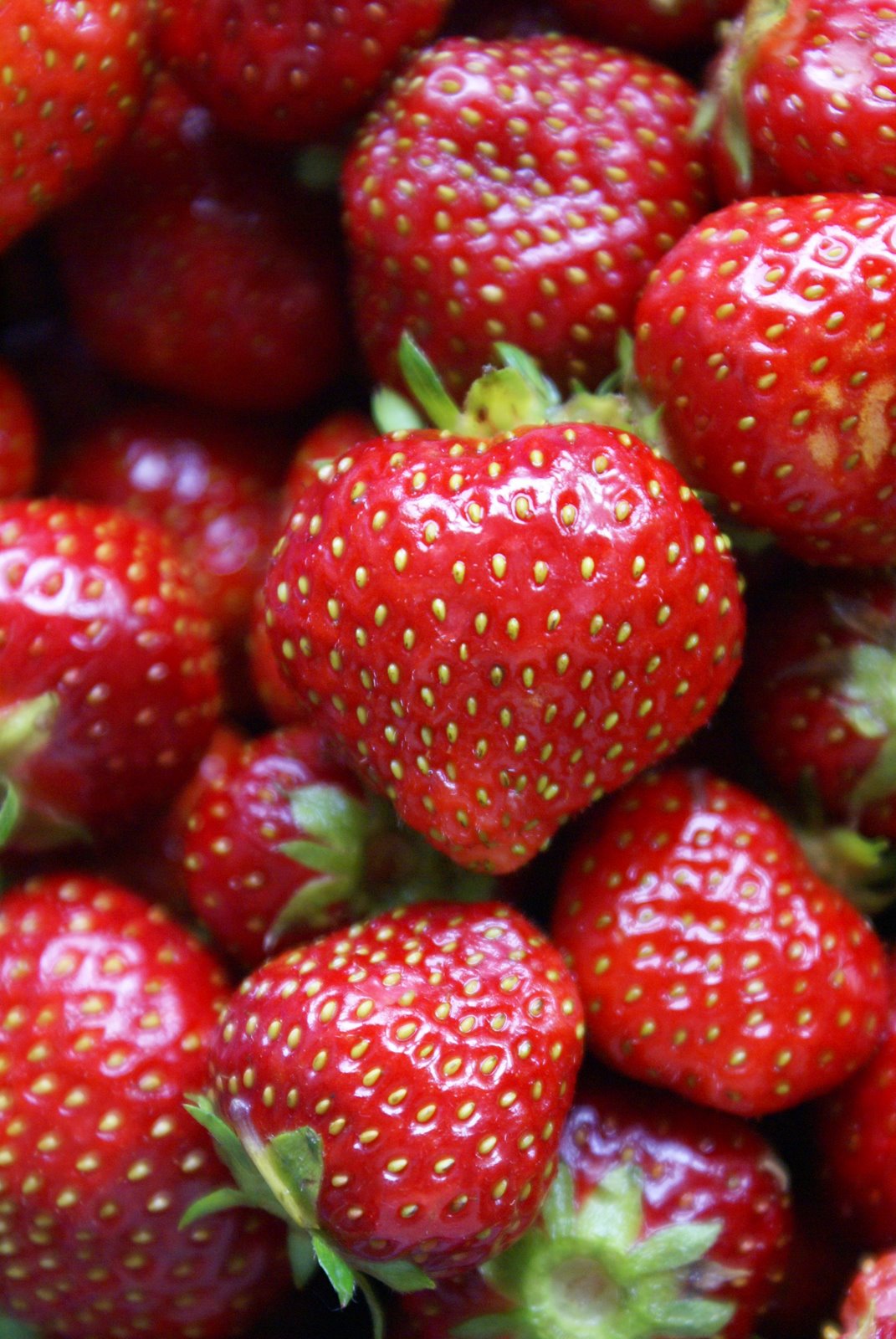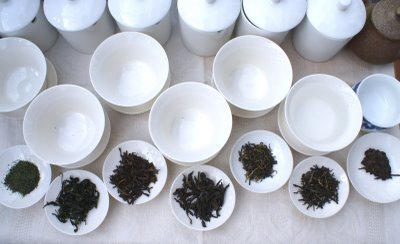Strawberries & tea
Posted on 15 July 2009

Tea & food matching is a hugely underdeveloped research field. Given tea’s similarities to wine in terms of variety and terroir character, there’s no reason why it shouldn’t behave similarly to wine in the endless combinations with food. And unlike coffee or whisky, tea effectively refreshes your palate and quenches your thirst, so it can be served through even an extended meal in countless variations.
Yet it’s really rare to see a more systematic approach to tea as an accompaniment to food. (Read
here for one interesting article). It’s a cultural thing. When served with Asian cuisine, tea is subordinated instead of elevated, and is expected to give a discrete support instead of taking first stage. (At Chinese restaurants it’s often served free of charge, so what kind of quality can you expect?). Flavoured tea such as jasmine or Lapsang Souchong are classic mealtime teas. When that antique puer cake is called upon, it’s served between meals to be sipped in isolation.As my first take on the subject I tackled the fairly straightforward subject of strawberries. They do make a natural match with tea, often being served outside a proper meal, at what is tellingly called ‘teatime’ in Europe. They’re not too sweet and can match with a wide range of teas.
The following teas were tasted at various times over the last weeks (half of them in a single sitting, which you can see on the photos). I’ve tried to brew each tea with what can be termed ‘standard parameters’: green with 70C water, oolongs, puers and blacks with boiling water and longer steeps. All teas were dosed at 2g for 100ml of water in porcelain competition tasting sets. Where available I have linked to my earlier reviews of the same teas so you can click for complete tasting notes.

2009 Sencha Fukamushi Supreme
From O-Cha (to be reviewed here soon). Brewed 90s @ 70C which resulted in a rather light tea with not a lot of tang. May I say this is a bit neutral and hardly adding much to the experience. Also I don’t quite like the grassy overtones with the strawberries’ fruitiness. Save this very good Japanese sencha for fish!
2008 Zhuyeqing
Not reviewed on this blog yet. It’s an excellent Chinese green from Sichuan, purchased from Dragon Tea House. It’s a very light, airy, elegant tea (be sure to brew with well-cooled water, not higher than 75C IME). Not a bad match at all, providing a discrete framework for the strawberries, though there’s no denying it’s much on the light side.
Not a happy match. The tea’s too nutty, and the mild astringency on the end is masking the strawberry fruit. They need a lighter, crisper flavour. 2008 Jirisan Woojun
This tea has a powerful flavour but even this remains a bit too green and pungent to accompany strawberries. 2008 Baozhong Fleur de Lys
A very lightly oxidised oolong from Taiwan that’s close to a green tea in body. Brewed 60s @ a low 90C to develop the floral character. I enjoy the flowery aromatic ornament this adds to the session, but there is something about the light buttery body than doesn’t quite match with the strawberries. This just lacks an element of flavour that would bridge to the fruit, and also the crisp tannicity of e.g. the below Dancong. Average match only.
2008 Dancong Milan Xiang AAA: spent leaves after 6 infusions.
A medium oxidation, very aromatic ’Phoenix’ oolong. Brewed 45s @ 95C, resulting in a less bitter brew than expected. Showing very well. Something about that highly aromatic flowery bitterness is enormously attractive when matched with fresh fruits. Although if too tannic this is becoming a problem. A brilliant natural match and one of few to generate a sweet-lasting huigan. Perhaps my favourite.
Tea Masters’ 2008 Baihao (Oriental Beauty), first infusion.
From Tea Masters (see comprehensive review of the 2007 here), to be reviewed here soon. This Taiwanese oolong has a high grade of oxidation and a very spicy, unfruity register. Not a bad match at all, spice juxtaposing strawberries well, if perhaps a little too dry on the finish. But at the same time I would also like a bit more body. Not perfect but a convincing match.
From left to right: Baozhong, Dancong, Shuijingui, Fengqing black tea, Fengqing green puer.
2008 Wuyi Shuijingui
Not reviewed on this blog yet. It’s another Dragon Tea House offering. It’s a classic Wuyi yancha oolong that however offers a more extravagant dried fruits bouquet than your average Shuixian. Brewed 30s @ 100C it gives a medium dark brew (see photo above) with moderate structure and expressive aromatics. It acts as a nice discrete support to the strawberries – which is perhaps disappointingly little for a top Wuyi. And there’s an irreconcilable clash between the high roast and the fresh fruit. Charcoal, roasted coffee, fumé, caramel: you don’t want these flavours juxtaposed on your strawberries, especially on the tea’s finish with its charcoal-flavoured edgy tannins. But I can think of worse matches: this is helped by this Shuijingui’s high aroma and expressive fruitiness.
2009 Fengqing Waishili
A hefty black tea from Yunnan. Brewed 90s @ 100C. Generally speaking, this is a miss. Oxidation, roast and smokiness just don’t pair (for my palate). Though culturally a black tea like this one would perhaps be a first choice for most Europeans. Not very pleasant: black tea just kills the fruitiness. Perhaps try with a fruitier type.
2008 Fengqing Fengshan Yihao: spent leaves.
Brewed 30s @ 100C, giving a very mildly bitter, nicely full-flavoured green puer that on its own was really quite enjoyable. As a match with strawberries, not bad, although structurally these seem two divergent entities: airiness versus depth; uncomplicated freshness versus complex undercurrents. Yet I like the vegetal kick of ku on the tea’s finish, and the bean-like flavour on the palate that emphasises the strawberries’ unsweetness. A good surprise and one of my preferred matches.
2008 12 Gentelmen Chun Ya Shen Yun
Not reviewed on this blog yet. This is a cooked puer from
2008 12 Gentelmen Chun Ya Shen Yun cooked puer, 45 seconds of infusion.

